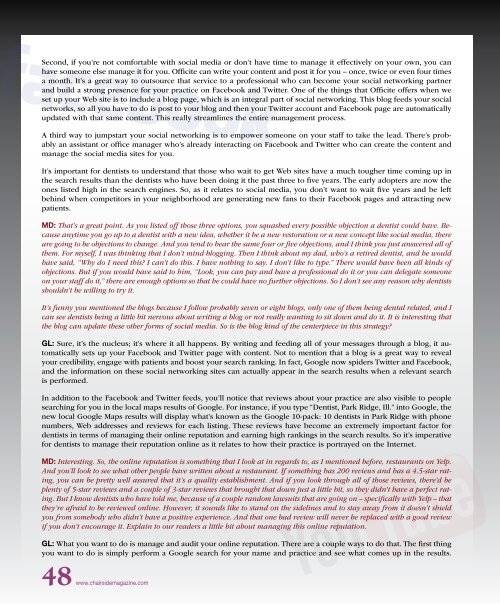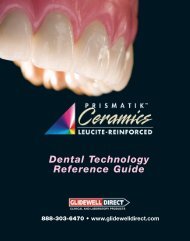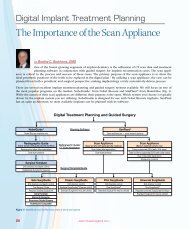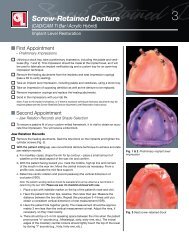PDF Version - Glidewell Dental Labs
PDF Version - Glidewell Dental Labs
PDF Version - Glidewell Dental Labs
Create successful ePaper yourself
Turn your PDF publications into a flip-book with our unique Google optimized e-Paper software.
Second, if you’re not comfortable with social media or don’t have time to manage it effectively on your own, you can<br />
have someone else manage it for you. Officite can write your content and post it for you – once, twice or even four times<br />
a month. It’s a great way to outsource that service to a professional who can become your social networking partner<br />
and build a strong presence for your practice on Facebook and Twitter. One of the things that Officite offers when we<br />
set up your Web site is to include a blog page, which is an integral part of social networking. This blog feeds your social<br />
networks, so all you have to do is post to your blog and then your Twitter account and Facebook page are automatically<br />
updated with that same content. This really streamlines the entire management process.<br />
A third way to jumpstart your social networking is to empower someone on your staff to take the lead. There’s probably<br />
an assistant or office manager who’s already interacting on Facebook and Twitter who can create the content and<br />
manage the social media sites for you.<br />
It’s important for dentists to understand that those who wait to get Web sites have a much tougher time coming up in<br />
the search results than the dentists who have been doing it the past three to five years. The early adopters are now the<br />
ones listed high in the search engines. So, as it relates to social media, you don’t want to wait five years and be left<br />
behind when competitors in your neighborhood are generating new fans to their Facebook pages and attracting new<br />
patients.<br />
MD: That’s a great point. As you listed off those three options, you squashed every possible objection a dentist could have. Because<br />
anytime you go up to a dentist with a new idea, whether it be a new restoration or a new concept like social media, there<br />
are going to be objections to change. And you tend to hear the same four or five objections, and I think you just answered all of<br />
them. For myself, I was thinking that I don’t mind blogging. Then I think about my dad, who’s a retired dentist, and he would<br />
have said, “Why do I need this? I can’t do this. I have nothing to say. I don’t like to type.” There would have been all kinds of<br />
objections. But if you would have said to him, “Look, you can pay and have a professional do it or you can delegate someone<br />
on your staff do it,” there are enough options so that he could have no further objections. So I don’t see any reason why dentists<br />
shouldn’t be willing to try it.<br />
It’s funny you mentioned the blogs because I follow probably seven or eight blogs, only one of them being dental related, and I<br />
can see dentists being a little bit nervous about writing a blog or not really wanting to sit down and do it. It is interesting that<br />
the blog can update these other forms of social media. So is the blog kind of the centerpiece in this strategy?<br />
GL: Sure, it’s the nucleus; it’s where it all happens. By writing and feeding all of your messages through a blog, it automatically<br />
sets up your Facebook and Twitter page with content. Not to mention that a blog is a great way to reveal<br />
your credibility, engage with patients and boost your search ranking. In fact, Google now spiders Twitter and Facebook,<br />
and the information on these social networking sites can actually appear in the search results when a relevant search<br />
is performed.<br />
In addition to the Facebook and Twitter feeds, you’ll notice that reviews about your practice are also visible to people<br />
searching for you in the local maps results of Google. For instance, if you type “Dentist, Park Ridge, Ill.” into Google, the<br />
new local Google Maps results will display what’s known as the Google 10-pack: 10 dentists in Park Ridge with phone<br />
numbers, Web addresses and reviews for each listing. These reviews have become an extremely important factor for<br />
dentists in terms of managing their online reputation and earning high rankings in the search results. So it’s imperative<br />
for dentists to manage their reputation online as it relates to how their practice is portrayed on the Internet.<br />
MD: Interesting. So, the online reputation is something that I look at in regards to, as I mentioned before, restaurants on Yelp.<br />
And you’ll look to see what other people have written about a restaurant. If something has 200 reviews and has a 4.5-star rating,<br />
you can be pretty well assured that it’s a quality establishment. And if you look through all of those reviews, there’d be<br />
plenty of 5-star reviews and a couple of 3-star reviews that brought that down just a little bit, so they didn’t have a perfect rating.<br />
But I know dentists who have told me, because of a couple random lawsuits that are going on – specifically with Yelp – that<br />
they’re afraid to be reviewed online. However, it sounds like to stand on the sidelines and to stay away from it doesn’t shield<br />
you from somebody who didn’t have a positive experience. And that one bad review will never be replaced with a good review<br />
if you don’t encourage it. Explain to our readers a little bit about managing this online reputation.<br />
GL: What you want to do is manage and audit your online reputation. There are a couple ways to do that. The first thing<br />
you want to do is simply perform a Google search for your name and practice and see what comes up in the results.<br />
48 www.chairsidemagazine.com

















